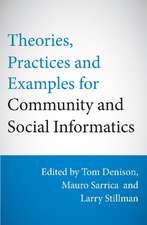Expressive Order: Confirming Sentiments in Social Actions
Autor David R. Heiseen Limba Engleză Paperback – 29 oct 2010
Briefly, affect control theory proposes that individuals shape their social interactions so that emerging impressions reinforce sentiments about salient identities, behaviors, and settings. Emotions signal how the process of confirming sentiments is going for each individual. The theory explains behaviors, emotions, social labeling, and personality attributions in a wide variety of social contexts – including intimate relations, work-world interactions, courtrooms, and international relations.
Part 1 of the book provides a plain-language exposition of the theory, along with numerous interpretive analyses of everyday situations. This is engaging and provocative reading for anyone interested in social relations, including undergraduates in and out of the social sciences.
Part 2 presents the mathematical derivations that define sentiment-confirming behavior, labeling, attribution, and emotion. The mathematical solutions, conjoined with understandings about social institutions, are the basis of the theory's explanations. The derivations clarify the theory's assumptions and reasoning, as only mathematics can.
Part 3 of Expressive Order describes the research program associated with the theory and the computer simulation software that is used in research. This part of the book offers a jump start for individuals wishing to use affect control theory in their own research.
| Toate formatele și edițiile | Preț | Express |
|---|---|---|
| Paperback (1) | 381.43 lei 6-8 săpt. | |
| Springer Us – 29 oct 2010 | 381.43 lei 6-8 săpt. | |
| Hardback (1) | 386.99 lei 6-8 săpt. | |
| Springer Us – 14 noi 2006 | 386.99 lei 6-8 săpt. |
Preț: 381.43 lei
Nou
Puncte Express: 572
Preț estimativ în valută:
73.01€ • 79.33$ • 61.37£
73.01€ • 79.33$ • 61.37£
Carte tipărită la comandă
Livrare economică 21 aprilie-05 mai
Preluare comenzi: 021 569.72.76
Specificații
ISBN-13: 9781441942562
ISBN-10: 1441942564
Pagini: 180
Ilustrații: XIV, 164 p. 5 illus.
Dimensiuni: 155 x 235 x 9 mm
Greutate: 0.26 kg
Ediția:Softcover reprint of hardcover 1st ed. 2007
Editura: Springer Us
Colecția Springer
Locul publicării:New York, NY, United States
ISBN-10: 1441942564
Pagini: 180
Ilustrații: XIV, 164 p. 5 illus.
Dimensiuni: 155 x 235 x 9 mm
Greutate: 0.26 kg
Ediția:Softcover reprint of hardcover 1st ed. 2007
Editura: Springer Us
Colecția Springer
Locul publicării:New York, NY, United States
Public țintă
Professional/practitionerCuprins
Preface.- Part I Affect Control Theory, Plainly Told.- Introduction .- Affect control theory.- Utility of the Theory .- Overview of the Book.- Further Readings.- Sentiments.- Evaluation, Potency, and Activity (EPA).-Measuring EPA .- Universality of EPA.- Further Readings.- Culture.- Consensus.- Individuality Versus Norms.- Measurement Implications.- Cultural Stability.- Instability or Unreliability? .- Variations Across Cultures.- Further Readings .- Sub-Cultures.- Gender.- A Pseudo-Sub-Culture.- Gendered Traits.- Gay Christians .- Deviance Sub-Cultures.- Non-Normalized Deviants .- Occupations.- Further Readings.- Defining Situations.- Identities.- Institutions.- Cues to Institutions.- Selves.- Multiple Identities.- Identity Modifiers.- Further Readings.- Interpreting Actions.- Action Frames.- Institutional Coherence.- Affective Processing .- Impression Formation.- Stability.- Behavior Effects.- Diminishment.- Consistencies.- Congruencies.- Balance.- States of Being .- Cross-Cultural Variations.- Versus Sentiments—Deflection.- Identifying Behaviors .- Further Readings .- Building Actions.-Selecting a Behavior.- Social Interaction.- Groups .- Avoiding Diminishment .- Social Roles .- Medicine.- Law .- Work Roles .- Macroactions .- Informal Roles.- Deviance.- Interactions With Deviants.- Interactions Among Deviants.- Further Readings .- Emotions .- Emotions as Signals.- Impressions and Emotions .- Characteristic and Structural Emotions .- Solidarity .- Emotions and Motivation .- Stress .- Self-Sentiments and Stress .- Emotions and Stress .- Emotions of Deviants.- Further Readings.- Changing Sentiments.- Re-identification .- Identity Filtering.- Labeling Deviants .- Attribution .- Inferences From Emotionality.- Identity Fluctuation.- Sentiment Change.- New Sentiments .- Enculturation.- Turning Points.- Further Readings.- Selves.- Salient Identities.- Commitment and Alienation.- Deviance Forays .- Deviants .- Self-Repugnance .- Patterns of Deviance .- Self-Fluctuation.- Cultural Shifts in Self .- Further Readings.- Part II Mathematics of Affect Control Theory .- Event Likelihood.- Optimal Behavior.- Incorporating Settings.- Self-Directed Action .- Optimal Identity.- Re-identifying Actors.- Re-identifying Object Persons .- Modifiers .- Emotions.- Characteristic Emotion.- Attributes.- Emotions and Re-identification .- Inferences From Mood.- Elaborations.- Self and Identities.- Minimizing Inauthenticity.- Illustrative Analyses.- Optimal Behavior.- Optimal Re-identifications.- Emotions and Re-identification.- Programming the Model.- Organization of Analyses.- Emotionality Constraints .- Impression-Formation Equations.- Selection .- Algorithms.- Part III Researching Affect Control Theory.- Growth of Affect Control Theory.- Chronology .- Branches.- Measurement of Affective Dimensions.- Impression Formation.- Theory and Mathematics.- Self.- Computer Programming.- Experiments.- Emotions.- Sub-Cultures, Gender, Ideology.- Life Course.- Social Structure, Social Change.- Politics .- Deviance .- Language and Arts.- Business .- Simulations.- Conducting Simulations.- Define Interactants Form.- Define Situation Form.- Define Events Form.- Analyze Events Form.- View Report Form .- Other Capabilities .- Errors.- Different Versions of Interact .- Further Readings .- Basic Concepts in Affect Control Theory.- References .- Index
Textul de pe ultima copertă
Expressive Order introduces affect control theory to lay readers of sociology, and additionally guides sociology specialists into the theory's deep structure.
Briefly, affect control theory proposes that individuals shape their social interactions so that emerging impressions reinforce sentiments about salient identities, behaviors, and settings. Emotions signal how the process of confirming sentiments is going for each individual. The theory explains behaviors, emotions, social labeling, and personality attributions in a wide variety of social contexts—including intimate relations, work-world interactions, courtrooms, and international relations.
Part 1 of the book provides a plain-language exposition of the theory, along with numerous interpretive analyses of everyday situations. This is engaging and provocative reading for anyone interested in social relations, including undergraduates in and out of the social sciences.
Part 2 presents the mathematical derivations that define sentiment-confirming behavior, labeling, attribution, and emotion. The mathematical solutions, conjoined with understandings about social institutions, are the basis of the theory's explanations. The derivations clarify the theory's assumptions and reasoning, as only mathematics can.
Part 3 of Expressive Order describes the research program associated with the theory and the computer simulation software that is used in research. This part of the book offers a jump start for individuals wishing to use affect control theory in their own research.
Briefly, affect control theory proposes that individuals shape their social interactions so that emerging impressions reinforce sentiments about salient identities, behaviors, and settings. Emotions signal how the process of confirming sentiments is going for each individual. The theory explains behaviors, emotions, social labeling, and personality attributions in a wide variety of social contexts—including intimate relations, work-world interactions, courtrooms, and international relations.
Part 1 of the book provides a plain-language exposition of the theory, along with numerous interpretive analyses of everyday situations. This is engaging and provocative reading for anyone interested in social relations, including undergraduates in and out of the social sciences.
Part 2 presents the mathematical derivations that define sentiment-confirming behavior, labeling, attribution, and emotion. The mathematical solutions, conjoined with understandings about social institutions, are the basis of the theory's explanations. The derivations clarify the theory's assumptions and reasoning, as only mathematics can.
Part 3 of Expressive Order describes the research program associated with the theory and the computer simulation software that is used in research. This part of the book offers a jump start for individuals wishing to use affect control theory in their own research.
Caracteristici
The most comprehensive available introduction to affect control theory, an important and expanding framework in sociology Describes in plain language how sociology's best developed cybernetic model can be used to interpret actions and emotions that arise in everyday life Shows how culturally-varying sentiments generate distinctive interactions and emotions among people in different societies, in different occupations and religions, and in normal versus deviant groups Exemplifies how mathematical analyses and interpretive analyses of social processes can each deepen the other, resulting in exceptional insights regarding human nature Includes supplementary material: sn.pub/extras












